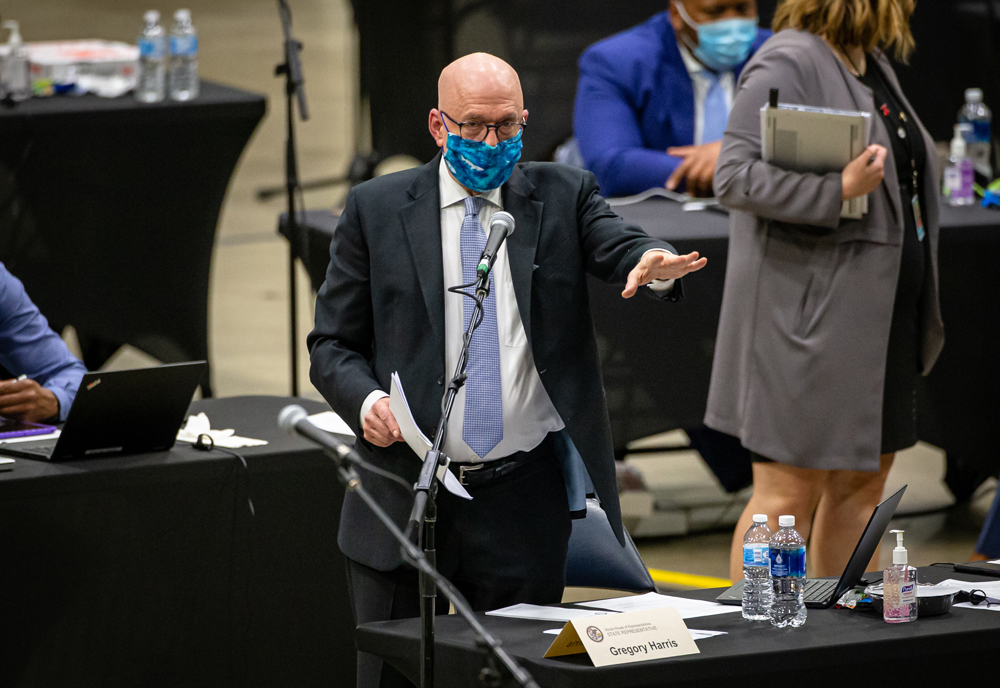Illinois State Rep. Greg Harris, D-Chicago, gives his opening remarks on SB 264, the state budget for the new fiscal year starting in July, during an extended session of the Illinois House of Representatives at the Bank of Springfield Center, May 23, 2020, in Springfield, Ill. The Illinois House of Representatives is holding session at the Bank of Springfield Center instead of the Illinois State Capitol because it allows for safe social distancing amid the COVID-19 pandemic. [POOL PHOTO/Justin L. Fowler/The State Journal-Register]
Lawmakers wrapped up work this weekend on an unusual spring session upended by the COVID-19 pandemic. Working into the early hours of Sunday morning, the General Assembly signed off on several healthcare-related plans, as well as a fiscal year 2021 budget reliant on federal aid.
The Illinois Senate voted just before 1 a.m. Sunday to approve roughly $41 billion in spending for the coming fiscal year.
The budget package is $1 billion less than what Gov. JB Pritzker unveiled in February – before the start of the COVID-19 pandemic.
The plan was approved along party lines in both chambers, with Republicans criticizing its reliance on billions of dollars in borrowing, including up to $5 billion from the federal government authorized by one of the recent stimulus packages.
Pritzker said Sunday that Illinois is not alone in this request, and he asked Congress to “do the right thing” to help the states.
He said over $900 million will be allocated to the Department of Public Health to assist with contact tracing and COVID-19 testing, including in areas disproportionately impacted by the pandemic.
The budget includes $3.8 billion from federal stimulus funds to address COVID-19 in the next fiscal year. That funding includes:
- $385 million to provide support to providers of long-term care services, excluding specialized mental health rehabilitation facilities. An additional $50 million will be given to support providers offering long-term care services to disproportionately impacted areas, based on positive COVID-19 cases.
- $150 million to support federally qualified health centers. An additional $40 million will support federally qualified health centers that serve disproportionately impacted areas, based on positive COVID-19 cases.
- $190 million to support ambulance providers, medical assistance providers, excluding specialized mental health rehabilitation facilities.
- $14.6 million to support specialized mental health rehabilitation facilities.
- $30 million for services including mental health, substance abuse and other counseling services and assistance for individuals and families impacted by the COVID-19 pandemic.
“For months now, medical professionals at these facilities have given their all to battling COVID-19,” Pritzker said. “This funding will help them keep their businesses running on the other side of this pandemic.”
The budget also dedicates $19.8 million to nine specific hospitals, which sponsor Rep. Greg Harris, D-Chicago, said was determined by looking at some of the most Medicaid-dependent providers in the state.
That raised concerns from Rep. Tom Demmer, R-Dixon, who asked Harris why other safety net or critical access hospitals were not also receiving funds.
“I guess there is a second avenue for select healthcare providers in the state to receive support, and that’s through some kind of back-room budget deal, which will come as news to the other 191 hospitals in the state of Illinois,” Demmer said.
Harris added the funds were to help address the disproportionate number of COVID-19 cases being seen in the communities around those hospitals.
“This funding will help them get through this extraordinary crisis that is causing tremendous extra expenses so they can better serve their communities,” he said.
Health News Illinois is removing the password on all stories related to the coronavirus. For the latest developments follow us on Twitter at @healthnewsil or check out our website. For complete healthcare coverage, sign up for a free trial to our daily email newsletter.
